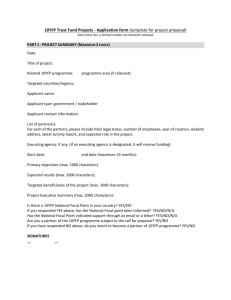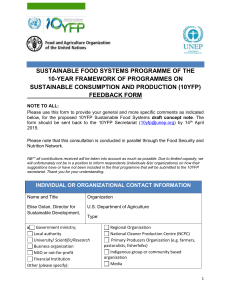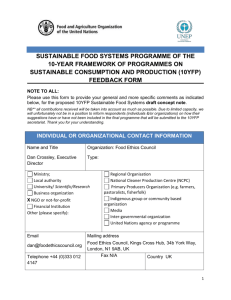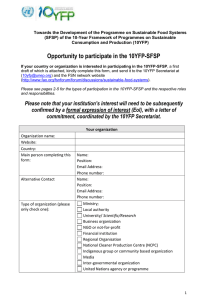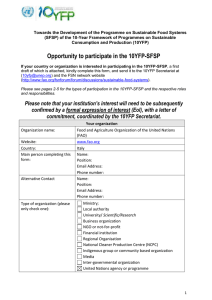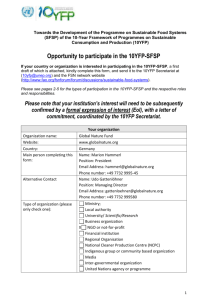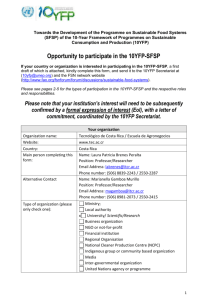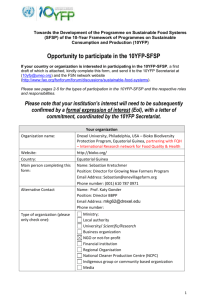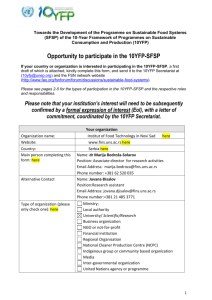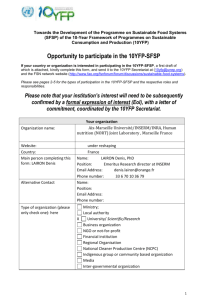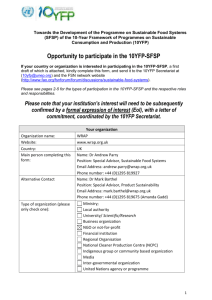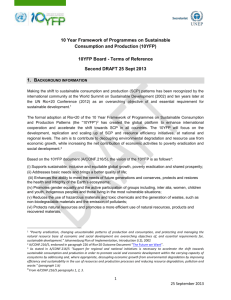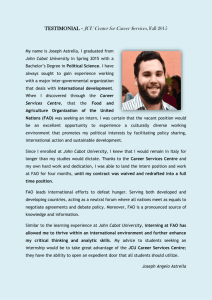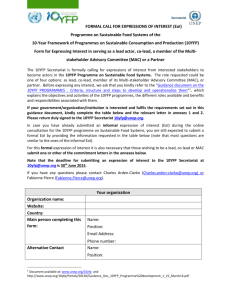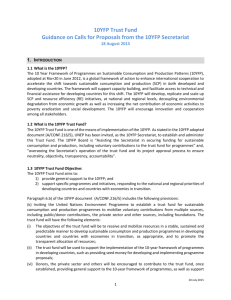Participation_in_SFS_programme_EN-voluntary standards
advertisement
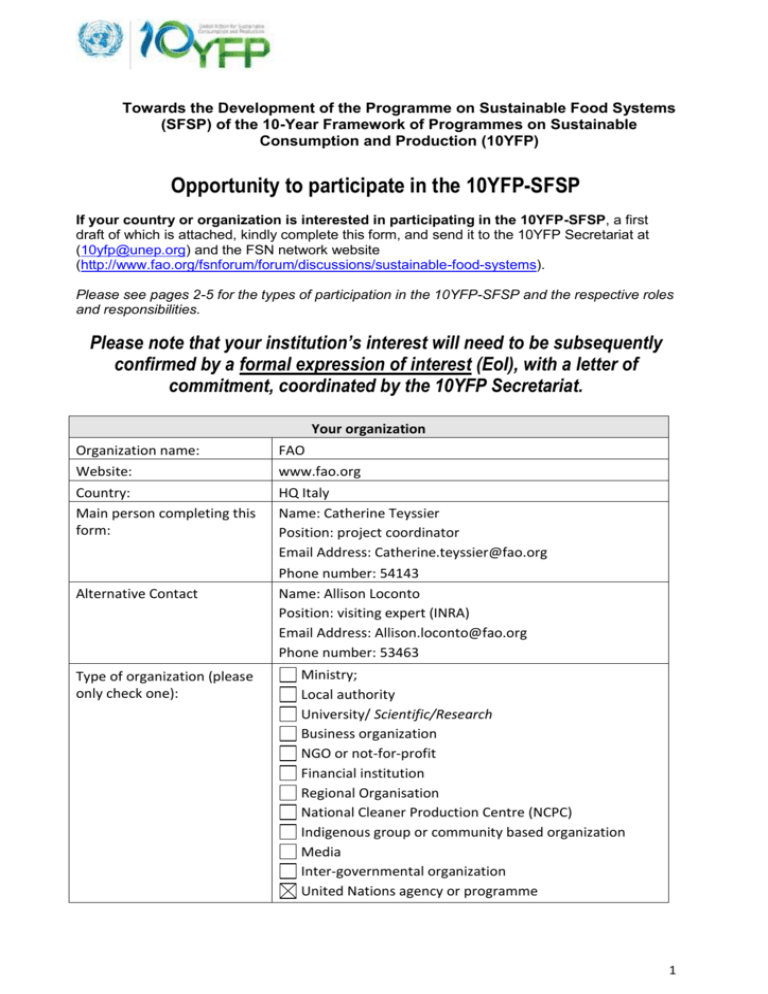
Towards the Development of the Programme on Sustainable Food Systems (SFSP) of the 10-Year Framework of Programmes on Sustainable Consumption and Production (10YFP) Opportunity to participate in the 10YFP-SFSP If your country or organization is interested in participating in the 10YFP-SFSP, a first draft of which is attached, kindly complete this form, and send it to the 10YFP Secretariat at (10yfp@unep.org) and the FSN network website (http://www.fao.org/fsnforum/forum/discussions/sustainable-food-systems). Please see pages 2-5 for the types of participation in the 10YFP-SFSP and the respective roles and responsibilities. Please note that your institution’s interest will need to be subsequently confirmed by a formal expression of interest (EoI), with a letter of commitment, coordinated by the 10YFP Secretariat. Your organization Organization name: FAO Website: www.fao.org Country: Main person completing this form: HQ Italy Name: Catherine Teyssier Position: project coordinator Email Address: Catherine.teyssier@fao.org Phone number: 54143 Name: Allison Loconto Position: visiting expert (INRA) Email Address: Allison.loconto@fao.org Phone number: 53463 Alternative Contact Type of organization (please only check one): Ministry; Local authority University/ Scientific/Research Business organization NGO or not-for-profit Financial institution Regional Organisation National Cleaner Production Centre (NCPC) Indigenous group or community based organization Media Inter-governmental organization United Nations agency or programme 1 Other (please specify): Brief description of your organization (please include objective and main areas of interest) Please specify your proposed participation in the 10YFP-SFSP Type of proposed Lead actor participation Co-Lead actor Member of Multi-stakeholder Advisory Committee (MAC) Coordinator of a programme work area Partner What is your main motivation to be part of the 10YFP-SFSP? Please explain in a few paragraphs Standards for food and agricultural products specify characteristics linked to the product’s content or composition, function or performance, process or production methods, origin, and/or labelling or packaging. Voluntary standards refer to a broad group of public and private standards whose adoption by users is not mandatory. They are developed by governments, intergovernmental organizations, private companies or consortia, non-governmental organizations or multiple stakeholders. Voluntary standards can offer market opportunities by facilitating compliance with international trade regulations and differentiating among products. They can deliver positive economic, environmental or social impacts, but they can also present challenges (costs and exclusivity), particularly for small-scale producers. How could your country or organization contribute to the development and implementation of the 10YFP-SFSP? The core aim of FAO’s work on voluntary standards is to contribute to mechanisms for ensuring that the interests of the public sector and smaller-scale stakeholders are addressed in the development and application of public and private voluntary standards. FAO actions FAO provides expertise on standards for food, agriculture, livestock, fisheries and forestry. It works with partners to benchmark, analyse, share knowledge and provide guidance on voluntary standards in the following ways. Please provide a brief description of your efforts in the field of sustainable food systems. 2 FAO provides expertise on standards for food, agriculture, livestock, fisheries and forestry. It works with partners to benchmark, analyse, share knowledge and provide guidance on voluntary standards in the following ways. Analysing trends in and impacts of voluntary standards. Recent work has focused on challenges and opportunities for smallholder participation in markets,1 tropical timber product standards, carbon footprints and livestock production. Disseminating information about voluntary standards through online portals and other communication tools, including Web sites on voluntary standards for responsible agricultural production and trade,2 organic agriculture,3 bioenergy sustainability initiatives,4 geographical indications5 and food labelling.6 Building capacity of policy-makers and private stakeholders through field projects. Worldwide, projects have provided assistance on market strategies, the implementation of standards, and farm certification processes for organic products, geographical indications, fair trade and global good agricultural practice (GAP). Setting up global tools, guidelines and benchmarking systems for use by the private and public sectors. Flagship tools are the Code of Conduct for Responsible Fisheries, the Technical Guidelines on Aquaculture Certification, the Sustainability Assessment of Food and Agriculture Systems, and the Harmonization and Equivalence in Organic Agriculture Regulations. Providing policy guidance to member countries on identifying priorities related to voluntary standards through advice on national policies, regulatory frameworks and strategies that can enhance food quality. Options include a broad range of quality schemes, from global standards, through national GAPs, to schemes based on traditional attributes, geographical origin and local knowledge. Building partnerships by convening or participating in multi-stakeholder fora for discussing voluntary standards. Key partnerships include the Sustainable Food Systems Programme between FAO and the United Nations Environment Programme (UNEP), the International Cotton Advisory Committee, the World Banana Forum and the United Nations Forum on Sustainability Standards. As the representative of my organization/government, I confirm that the information is correct and true. Date 27/04/2015 Name Catherine Teyssier 1 http://www.fao.org/ag/ags/agribusiness-development/food-quality-assurance-and-certification/en/ http://www.fao.org/economic/est/international-trade/standards-certification/en/ 3http://www.fao.org/organicag/en 4http://www.fao.org/energy/befs/compilation/en/ 5http://www.foodquality-origin.org/home/en/ 6http://www.fao.org/ag/humannutrition/foodlabel/en/ 2 3 Before expressing any interest, please, kindly read carefully the “Guidance document on the 10YFP PROGRAMMES : Criteria, structure and steps to develop and operationalize them”7, which explains the objective and activities of the programme, the different roles available and benefits and responsibilities associated with them. Immediately below you will find a summary of the role and responsibilities of the Lead and Co-leads, Multi-stakeholder Advisory Committee (MAC) members, and Partners of the programme. These will be set out in more detail in the formal Expression of Interest form that you will receive subsequently from the 10YFP Secretariat. ____________________________________________________________________ Role and Responsibilities of the Lead and Co-leads of a 10YFP Programme: Support the overall coordination of the programme implementation and proactively fundraise for the programme; Provide financial and/or in-kind contribution, including dedicated staff in support of a “Coordination Desk” (each programme will need a minimum of 1-2 full time staff to start operating); Jointly supervise the work of the Coordination Desk (whose tasks could be executed from different geographical locations); Chair and co-chair the MAC meetings, facilitate the decision-making within the Committee and support its activities, including those related to securing support from the 10YFP Trust Fund; Act as liaison and focal point for contacts between the Secretariat and the SFS programme and all its partners; Report on progress and outcomes as required, including through the preparation of an annual report for the 10YFP Secretariat to convey to the Board and to be included in the 10YFP report to ECOSOC. Criteria for lead and co-leads: Any government from any UN member state relevant regional or national organizations, international organizations (including UN agencies), industry or business organizations, non-governmental/civil society organizations or academic institutions, or any other entity that supports the goals of the 10YFP (www.unep.org/10yfp) and agrees to work towards them can apply to become a lead or a co-lead of a specific 10YFP programme. The lead and co-lead(s) should: • demonstrate an active or leading role in supporting the shift towards sustainable consumption and production patterns at national and/or regional levels; 7 Document available at: www.unep.org/10yfp and http://www.unep.org/10yfp/Portals/50150/Guidance_Doc_10YFP_Programme%20development_1_V1_March14.pdf 4 • provide resources (including in-kind contributions or expertise) for coordination and implementation of activities under this programme; and • ensure minimum commitment to remain engaged for at least four years. Role and Responsibilities of the MAC of a 10YFP Programme: review goals, objectives and measures of success, based on the initial programme’s work plan, with the aim of providing guidance on progress towards more sustainable consumption and production patterns; review on the performance and evolution of the programme’s work plan, advise on and proactively engage new partners, initiatives and activities in the line with the objectives of the programme, as well as in response to emerging demand and priorities; enhance synergies and cooperation among stakeholders within the programme as well as with other programmes of the 10YFP; propose projects and/or activities for implementation in accordance with the work plan of the programme; provide guidance to the 10YFP Secretariat for the elaboration of calls for proposals for the 10YFP Trust Fund, in the area of the programme, and to screen and short list proposals received based on established criteria; Criteria for the members of the Multi-stakeholder Advisory Committee Any government from any UN member state relevant regional or international organizations, industry or business organizations, non-governmental/civil society organizations or academic institutions, or any other entity that supports the goals of the 10YFP and agrees to work towards them can apply to become a member of the MAC of a specific programme. The composition of the MAC ideally could reflect a diversity of partner categories and geographic regions, in this context, members of the MAC should: demonstrate strong interest and/or recognized expertise and experience, if possible reflected in policies and actions, in the area of the programme; have played an active or leading role in supporting the sustainable consumption and production and/or sustainable development agenda at the national and/or regional levels. Role of Coordinators of the Programme Work Areas Coordinators of a programme work area are not necessarily members of the MultiStakeholder Advisory Committee, but can take an active role in coordinating one or more of the programme work areas. When coordinating a work area of the programme, they are responsible for ensuring that the related activities are delivered in an inclusive and effective manner. They bring their expertise, expand their networks and partnerships, build synergies and help scale-up and replicate best practices on SCP at 5 all levels. ____________________________________________________________________ Role of Partners Any stakeholder supporting implementation and/or benefiting from the activities of the programme could be a partner of a programme. Those activities include workshops, trainings, making use and supporting dissemination of the materials, including policy and capacity-building tools and reports produced by the programme. Partners do not necessarily need to provide technical and/or financial support. Thank you very much for your time., 6
